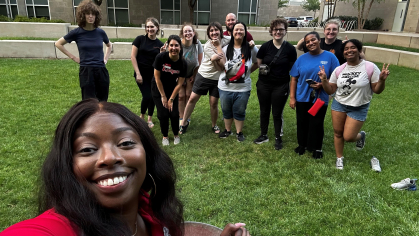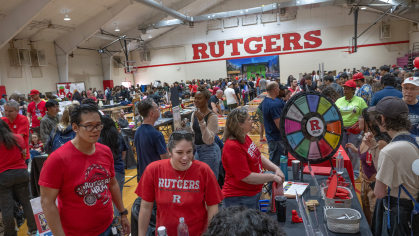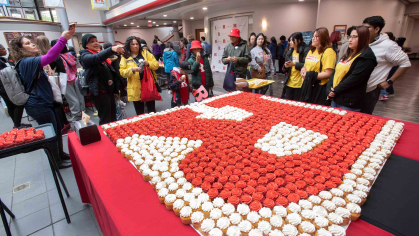Alumnus Volunteers With Humanitarian Relief Efforts for Ukraine
Mark Di Ionno spent 10 days on the Polish-Ukrainian border and recently returned to the front lines of the conflict
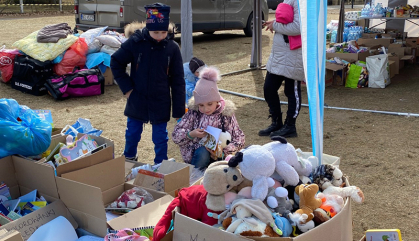
In my dozen years as a journalism adjunct primarily at Rutgers-Newark with a few stints in New Brunswick, I’ve always told students the best stories are behind the police tape, told by people who are not officials.
I did not go to the Poland-Ukraine border in search of stories. I went to help, but I knew stories of resilience in the face of traumatic dislocation would be there.
On March 9, when I drove to the farm village of Dororusk on the other side of the Bug River from Ukraine, 2.5 million refugees had already inundated Poland. When I left 10 days later, the number had swelled to 3.5 million. Warsaw, Poland’s capital and largest city, which had two million residents before Russia’s attack on Ukraine, saw its population rise by nearly 20 percent in one week as refugees flooded in.
The two-lane, rural highway that eventually led to Kyiv was predictably blocked by police about a mile from the border. The road to my left curved toward Ukraine so I took it, thinking there might be an unprotected backroad to get me closer.
Past the squat masonry houses of Dorohusk, I saw a sign “Punkt Reczycpjyn” (reception point) with the name also in the Cyrillic letters of Ukraine’s alphabet and took a dirt road where the three large red canopies of the international Catholic relief agency Caritas covered only part of a half-acre of boxes of donated clothes, food, medicine, and hygienic and personal care supplies.
This would be my day job for the week and a half. My night job took me to rail station in Chelm, where trains from Kyiv arrived packed with hundreds of refugees at all hours as Polish volunteers tried register them, feed them, and help them to their next location – if they had one. From there, as well as Dororusk, I drove several families deeper into Poland, to Warsaw, Lublin and Lowicz, a city between Warsaw and Lodz, and places I can’t remember because I can’t pronounce them.
It was on these trips I heard the stories of hardship. As two little girls slept against their mother in the back seat of my rented Opel Astra station wagon, their aunt told me every man in the family stayed to fight, except the 14-year-old boy, also in the back. I took them to the Lublin-Glowny station where they would take a train to Kedzierzyn-Kozle near the Czechoslovakia border, another five hours away. This was after five hours on the train from Kharkiv, where their home was bombed and destroyed, to Kyiv, then 11 more hours to Chelm, all back to back.
This family was very typical of all those I met, including my first night when I drove to Lublin from Warsaw after an all-night flight, and checked into the Huzar Hotel and quickly learned I was the only guest not from Ukraine.
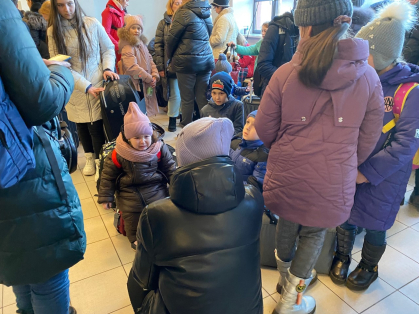
It was there I met Elena Richkokasha, a 49-year-old grandmother, who spent much of her day in a gray bathrobe watching her grandson, Alec, 3, run around in an unlighted, second-floor lobby of the Huzar Hotel with other children of refugee families.
She is here with her daughter, Alina Yavir, Alec’s mother, and her daughter-in-law, Kristina Ivanova, 20, who is married to her son, Ivan, and pregnant. Kristina's husband is in the Ukrainian Army Reserves and Yavir's is a member of the Territorial Defence Forces.
“He stayed home to defend the country,” said Alina, speaking through a translation app.
“We have so much to worry about,” she said. “Our children, the men, our homes, our future.”
The family left the Russian-occupied region of Donetsk when shelling there intensified at the start of this war. Before Russia’s full-scale invasion, there was fighting in the region between Kremlin-backed Donetsk separatists and Ukrainian soldiers.
"We are so tired of war," Elena said. "It is too much."
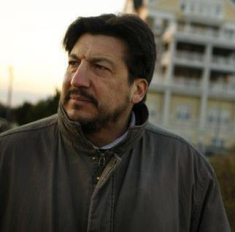
Whether these families arrive by train in Chelm or by buses that drop them off at Starovoitive, the Ukraine exit point across from Dororusk, they come dragging airline luggage, shouldering backpacks, and carrying suitcases, gym bags or anything else in which they could stuff essential belongings. They cross the line from their past into an uncertain present and future. This is the price of freedom.
Here I met Lubya Tsaruk who waited for her sister to arrive from Glowno, 230 miles away in the center of Poland.
She was with her three children, Sony, 6, Lera, 4, and Maks, 2, and her nephew, Stas Radchuck. The family came from Sarny, near the border with Belarus, a country also hostile to Ukraine.
Tsaruk said her husband remained home to defend the country and she equally feared the possibility they would be attacked by soldiers from Belarus. She hopes he will join her in Poland when the war ends, and says she never wants to return home.
“Where we live no longer feels safe,” she said. “I don’t want that kind of future for my children. It’s hard to believe this is happening to us. Ten days ago (then), everything was normal.”
Mark Di Ionno is a veteran journalist, Pulitzer Prize finalist and graduate of Rutgers-Newark.
